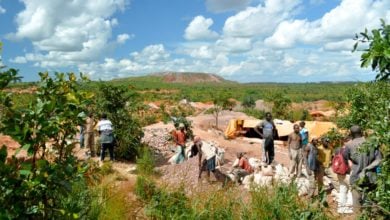When it comes to growth outside the core capitalist
economies in America and Europe, the “success” stories touted in the capitalist
media are usually about countries like Brazil, Turkey, China, India and South
Korea. Rarely, if ever, are African countries featured in this discussion. A
recent economic survey of the continent, however, has sought to change that
perception. In a continent-wide survey, McKinsey Global Institute, the business
and economics research arm of consulting firm McKinsey & Company, has
produced data that seems to contradict the mostly negative views of economic
growth in Africa.
The report has gained media attention for some of the
impressive statistics cited. For example, it notes that Africa’s collective GDP
now equals that of Brazil and Russia. It also states that 27 of the continent’s
30 largest economies are expanding, productivity is increasing and growth is being
driven by a range of sectors, with resource extraction being more or less
co-equal with other factors. All of which is attracting increasing amounts of
foreign investment.
There is no doubt that Africa overall is growing. However,
if we look behind the numbers, we can see that the reality of capitalist
economic expansion in Africa is not as rosy as the McKinsey researchers would
have us believe.
Uneven development
The McKinsey study focuses on general trends. While many of
its observations hold true across countries and regions, the trends highlighted
have limited value. There is a marked difference, for example, between growth
patterns and prospects in Sahelian countries like Niger or Mali and the
increasingly integrated East African Community states. Nevertheless, insofar as
the trends give an accurate general picture, they deserve closer inspection.
One of the central elements underlying the report’s optimism
is the role of urbanization. The authors note:
“In 1980, just 28 percent of Africans lived in cities.
Today, 40 percent of the continent’s 1 billion people do—a proportion
comparable to China’s and larger than India’s. …
“To be sure urbanization can breed misery. … But in many
African countries, urbanization is boosting productivity. …”
The McKinsey report recognizes negative elements of the
current urbanization but counterposes to them increased productivity. As the
report points out, productivity is increasing in many African countries as
workers move from rural areas into various sectors of employment in the cities.
Increased productivity and intensified exploitation often go
hand and hand. In Nigeria, where manufacturing and services are growing
rapidly, 25 percent of urban workers put in the average 40 hours a week, while
46.1 percent toil 41-56 hours and 21 percent over 56 hours.
Indeed Lagos, Nigeria’s largest city, has one of the
sharpest economic divides in the world, with a consumption Gini Coefficent of
0.64 (0 indicates total equality and 1 maximal inequality). According to the U.N.,
two-fifths of Lagos residents live in overcrowded housing, and a quarter have
no access to adequate sanitation.
Growth does not necessarily correlate with employment
either. South Africa managed a 4 percent average growth rate from 1999 to the
fourth quarter of 2007. Applying the more “narrow” definition of unemployment,
in this same period the rate of unemployment in South Africa hovered between 25
and 27 percent. A broader definition yields a rate of between 35 and 42 percent
for the same period.
Inequality a built-in feature
These statistical observations point to the primary flaw of
the study and the optimism in its analysis of trends and patterns. In the
broadest sense, there is economic growth in Africa, but this is capitalist
growth, where inequalities are a built-in feature. Forced off the land and into
cities, millions of urban dwellers suffering substandard living and working
conditions have contributed to an increasing productivity. Without the ability
to rely on subsistence agriculture for many daily goods, even the poorest
sectors of these urban dwellers can contribute to the increased consumption
that the McKinsey study highlights.
One only has to look at South Africa’s growth path more
closely to see that increased general growth along with increased foreign
capital inflows have created an extremely unequal and tiered society. While a
Black elite and middle class has grown, the number of the destitute unemployed
and overworked has also grown. Between 1995 and 2005, the Gini Coefficient for
that country increased from 0.64 to 0.69.
Growth, then, can have different meanings. To some, a few
nations becoming “African lions” like the “Asian tigers” of the past is
exceedingly positive. For them, the growth of the wealthy elites and middle strata
far outweigh in importance the high levels of poverty for the majority that
co-exist with them. For others, including this publication, such inequality is unacceptable.
Africa has tremendous natural and human resources upon which
wealth can be built. A growth process that hands that wealth primarily to a
handful of domestic and international elites is neither fair nor positive.
Africa needs much more. It needs its massive wealth to be directed toward
combating the hundreds of years of colonialism and neo-colonialism, which have
in the past and continue today to ravage the continent.
The McKinsey study has shown us capitalism’s answer to
Africa’s continued underdevelopment: a simple change in the pattern of
exploitation and more development in general at the expense of the broad masses
of working people, who are to be exploited as laborers and consumers of
low-quality goods and services, at the mercy of super-wealthy domestic elites
and their imperialist overlords.
We look to the workers’ and peasants’ movements in Africa,
such as those represented at the recent Pan-African Youth Festival in Dakar, to show the way to a truly bright future for Africa, where her wealth is at
the disposal of her people, a socialist future.





